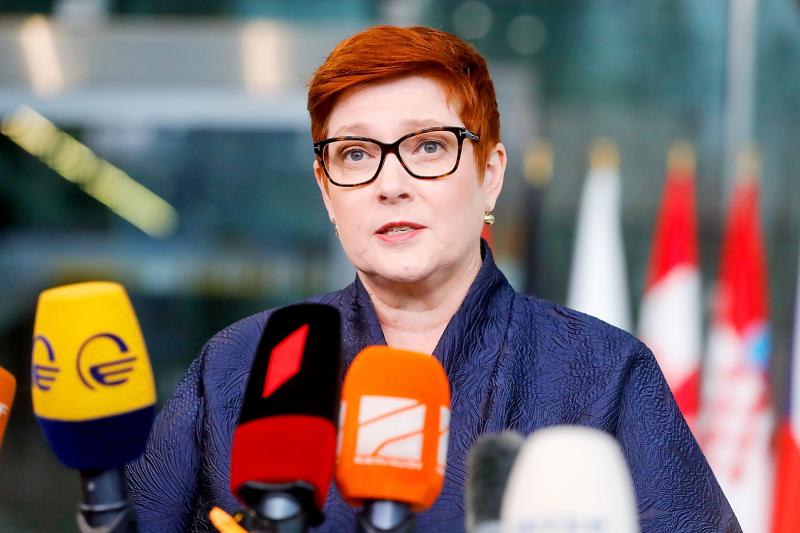Australia’s foreign minister has met her Solomon Islands counterpart for the first time since the South Pacific island nation signed a security pact with China.
Australian Minister of Foreign Affairs Marise Payne yesterday said she met Solomon Islands Development Planning and Aid Coordination Minister Jeremiah Manele in the Australian east coast city of Brisbane as he transited through the airport on Friday night.
“Australia has been consistent and clear in stating our respect for Solomon Islands’ sovereign decisionmaking, however we have reiterated our deep concerns about the security agreement with China, including the lack of transparency,” Payne’s office said in a statement.

Photo: EPA-EFE
Payne’s office said the pair agreed that Australia remained the Solomon Islands’ security partner of choice and that the Solomon Islands would not host a foreign military base less than 2,000km off Australia’s northeast coast.
Manele could not be contacted for comment yesterday.
Australian Minister for Trade, Tourism and Investment Dan Tehan told Australian Broadcasting Corp that the two ministers had a “very productive conversation.”
A Chinese base in the Solomon Islands was not in the interests of the region, Tehan said.
“What we want to do is to be making sure that we’re presenting a very strong case as to why it is incredibly important that we don’t see militarization of the Pacific islands,” Tehan said.
Tehan said Payne and Manele also discussed how Australian Prime Minister Scott Morrison’s government needed to keep working on the bilateral relationship.
Morrison’s coalition is seeking a rare fourth three-year term in elections on May 25.
The China-Solomon Islands security pact announced last month has become a major focus of the election campaign.
After details of a draft pact were released, Australian Minister for International Development and the Pacific Zed Seselja flew to the Solomon Islands’ capital, Honiara, on April 12 to unsuccessfully ask the government to abandon it.
The opposition Labor Party said at the time that Payne, a more senior minister than Seselja, should have been sent instead.
Opposition leader Anthony Albanese welcomed Payne’s meeting with Manele.
“It’s about time,” Albanese said.
Albanese has also criticized Morrison for not telephoning Solomon Islands Prime Minister Manasseh Sogavare since the pact was signed.
Morrison has said he was following the advice of intelligence officials.
The Labor Party has condemned the pact as Australia’s worst foreign policy failure in the Pacific since World War II. Albanese has promised closer engagement between Australia and its South Pacific island neighbors if Labor wins government.
Australian Home Affairs Minister Karen Andrews has suggested that Beijing timed the pact’s announcement during an election campaign to undermine her Liberal Party’s prospects for re-election.

Intelligence agents have recorded 510,000 instances of “controversial information” being spread online by the Chinese Communist Party (CCP) so far this year, the National Security Bureau (NSB) said in a report yesterday, as it warned of artificial intelligence (AI) being employed to generate destabilizing misinformation. The bureau submitted a written report to the Legislative Yuan in preparation for National Security Bureau Director-General Tsai Ming-yen’s (蔡明彥) appearance before the Foreign Affairs and National Defense Committee today. The CCP has been using cognitive warfare to divide Taiwanese society by commenting on controversial issues such as Taiwan Semiconductor Manufacturing Co’s (TSMC, 台積電) investments in the

INVESTIGATION: The case is the latest instance of a DPP figure being implicated in an espionage network accused of allegedly leaking information to Chinese intelligence Democratic Progressive Party (DPP) member Ho Jen-chieh (何仁傑) was detained and held incommunicado yesterday on suspicion of spying for China during his tenure as assistant to then-minister of foreign affairs Joseph Wu (吳釗燮). The Taipei District Prosecutors’ Office said Ho was implicated during its investigation into alleged spying activities by former Presidential Office consultant Wu Shang-yu (吳尚雨). Prosecutors said there is reason to believe Ho breached the National Security Act (國家安全法) by leaking classified Ministry of Foreign Affairs information to Chinese intelligence. Following interrogation, prosecutors petitioned the Taipei District Court to detain Ho, citing concerns over potential collusion or tampering of evidence. The

‘COMPREHENSIVE PLAN’: Lin Chia-lung said that the government was ready to talk about a variety of issues, including investment in and purchases from the US The National Stabilization Fund (NSF) yesterday announced that it would step in to staunch stock market losses for the ninth time in the nation’s history. An NSF board meeting, originally scheduled for Monday next week, was moved to yesterday after stocks plummeted in the wake of US President Donald Trump’s announcement of 32 percent tariffs on Taiwan on Wednesday last week. Board members voted to support the stock market with the NT$500 billion (US$15.15 billion) fund, with injections of funds to begin as soon as today. The NSF in 2000 injected NT$120 billion to stabilize stocks, the most ever. The lowest amount it

NEGOTIATIONS: Taiwan has good relations with Washington and the outlook for the negotiations looks promising, Minister of Economic Affairs J.W. Kuo said Taiwan’s GDP growth this year is expected to decrease by 0.43 to 1.61 percentage points due to the effects of US tariffs, National Development Council (NDC) Minister Paul Liu (劉鏡清) said at a meeting of the legislature’s Economics Committee in Taipei yesterday, citing a preliminary estimate by a private research institution. Taiwan’s economy would be significantly affected by the 32 percent “reciprocal” tariffs slapped by the US, which took effect yesterday, Liu said, adding that GDP growth could fall below 3 percent and potentially even dip below 2 percent to 1.53 percent this year. The council has commissioned another institution